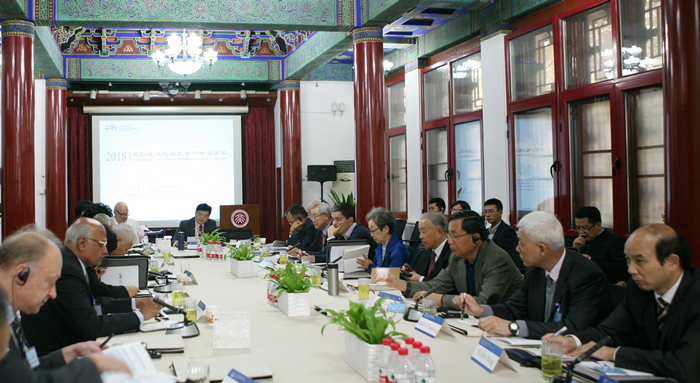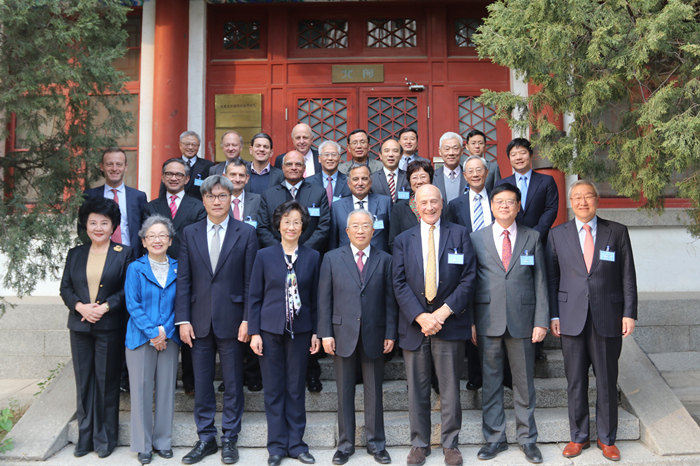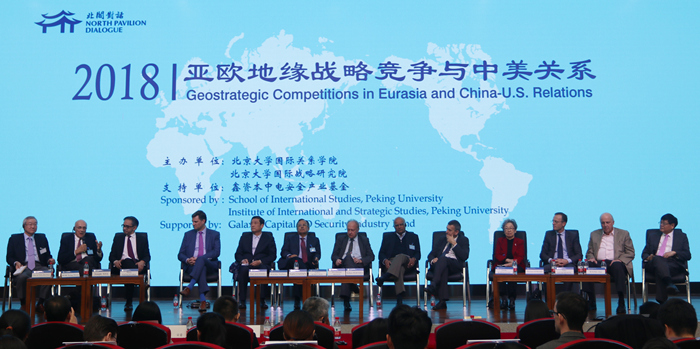
From October 19 to 21, 2018, the fifth annual meeting "North Pavilion Dialogue" was held in Peking University (PKU). The Institute of International & Strategic Studies (IISS), PKU, organized the “North Pavilion Dialogue”, highly supported by PKU and School of International Studies. It invites personages with profound academic accomplishment, rich political experience and far-reaching strategic vision to discuss international strategic situation and prospects for great powers' relations.
The theme of the annual meeting is “Geostrategic Competitions in Eurasia and China-U.S. Relations". The central subjects discussed at this meeting concerns how to manage strategic divergences and to further avoid strategic confrontation among major powers, especially between China and the United States in the context of such complicated and unpredictable international circumstances. Under the impetus of technological progress and economic globalization, the wealth gap has further widened on a global scale. At the same time, the large-scale population flows have given rise to the emergence and prominence of identity politics, and there has been a growing trend of polarization and political ruptures in today’s world politics. Under this circumstance, competition among major powers has also entered a new stage, featuring the rising risks of strategic confrontation in various fields including trade, military and ideology.
At present, although to some extent tensions have been eased in terms of regional hot-spot issues including North Korea nuclear issue, the China-U.S. relations are confronting with unprecedented challenges. Nationalism, along with populism, has been on the rise in the United States, which results in a tough stance taken by the U.S. government respecting to the assertive foreign policy against its major competitors including China.
In the face of growing trade conflicts and increasing confrontation and tensions in the bilateral relations, it is imperative for both China and the United States that they are able to reach a compromise and re-establish the stability of relations between the two major powers by the means of a rational approach. This result is of vital significance not only on the development of two countries themselves, but also on the global political and economic prospects.

12 foreign guests were invited this year, they are: Kevin Rudd, former Prime Minister of Australia, John Negroponte, former Deputy Secretary of State of the United States, Joseph Nye, Jr., Professor at Harvard University of the United States, David Miliband, former Minister of Foreign Affairs of the United Kingdom, Andrey Kortunov, Director General of the Russian International Affairs Council, Shivshankar Menon, former National Security Advisor to the Prime Minister of India, Nabil Fahmy, former Minister of Foreign Affairs of Egypt, Marty Natalegawa, former Minister of Foreign Affairs of Indonesia, Yoriko Kawaguchi, former Minister of Foreign Affairs of Japan, Kim Sung-Hwan, former Minister of Foreign Affairs of Korea, Thomas Gomart, Director of French Institute of International Relations (IFRI), and Volker Perthes, Executive Chairman and Director of Stiftung Wissenschaft und Politik.
Domestic guests include Dai Bingguo, former State Councilor, PRC, Qiu Yuanping, former Minister of the Overseas Chinese Affairs Office of the State Council, Chen Xiaogong, former Deputy Director of the Central Foreign Affairs Office, and Lieutenant General of the Air Force, Zhang Baijia, former Deputy Director of the Party History Research Center of the CPC Central Committee, Yao Yunzhu, Director Emeritus of the Center on China-American Defense Relations, the Academy of Military Science (AMS), Yuan Peng, President, China Institutes of Contemporary International Relations (CICIR), Zhang Tuosheng, Chairman of the Academic Committee of the China Foundation for International and Strategic Studies, Cui Liru, Senior Advisor, former President, China Institutes of Contemporary International Relations, Yan Xuetong, Dean of the Institute of International Relations, Tsinghua University, Wang Yizhou, Associate Dean of the SIS, PKU. Administration and professors of the IISS and the School of International Studies (SIS), PKU also attended the annual meeting, they are: Wang Jisi, President of the IISS, PKU, Yuan Ming, Vice President of the IISS, PKU, Guan Guihai, Executive Vice President of the IISS, PKU. On behalf of Professor Hao Ping, Chairman of Peking University Council, Professor Wang Bo, Vice President of PKU participated in the conference, and had amiable talks with foreign and domestic guests.
The annual meeting is scheduled to last for three days, one and a half day for closed-door seminars, a half-day for open forum. During the closed-door seminars, participants concentrated on discussion of geostrategic competitions both in Eurasia and in Asian-Pacific region, including the heading direction of competition, the future of China-U.S relations, the situation in Korean Peninsula, and how to manage geostrategic tensions etc. They also had in-depth exchange of views on how to stabilize the regional situation, how to prevent countries from conflictions and tensions, how to strengthen international cooperation mechanism, providing many valuable ideas and suggestions.

On the afternoon of October 21, in the open forum of " Geostrategic Competitions in Eurasia and China-U.S. Relations" co-organized by the IISS and the SIS, PKU, thirteen guests, including Joseph Nye, Jr., John Negroponte, Yoriko Kawaguchi, Kim Sung-Hwan, Andrey Kortunov, Marty Natalegawa, Volker Perthes, Nabil Fahmy, Shivshankar Menon, David Miliband, Thomas Gomart, Wang Yizhou and Paul Saunders, Executive Director of the Center for the National Interest, had a frank and heated discussion on how to cope with new situation and challenge in the geostrategic competitions, and had an in-depth interaction with the audience. Prof. Wang Jisi hosted the open forum.
On the afternoon of October 23, David Miliband, former Minister of Foreign Affairs of the United Kingdom, made a keynote speech titled "The Global Refugee Crisis: How Should We Respond?" at the North Pavilion, PKU. Yuan Ming, vice President, Institute of International and Strategic Studies, Dean of Yenching Academy, Peking University hosted the lecture.
IISS, PKU was officially founded in October 2013, with Dai Bingguo, former State Councilor of China, as its honorary president. Under the leadership of PKU, IISS relies on the rich intellectual resources of the SIS and other relevant departments of PKU, undertakes research topics commissioned by government agencies and enterprises, and is engaged in providing high-quality consulting services on China's international strategy and foreign policy. It has also established a closer partnership among think tanks and academic institutions around the world.
From 2014 on, IISS holds the "North Pavilion Dialogue" annually. This is one of the initiatives of PKU to implement General Secretary Xi Jinping's instruction of "building new type of think tanks with Chinese characteristics". IISS plans to progressively build the "North Pavilion Dialogue" into a high-profile platform to facilitate exchanges and cooperation among domestic and foreign peers in the international strategic community and enable them to make accurate judgments of the world situation, help China play an international role and promote win-win cooperation and inclusive development in global politics.
The North Pavilion of the "North Pavilion Dialogue", formerly known as the Luella Miner Pavilion, is located in the central part of the scenic Yan Yuan Garden and now accommodates the office of IISS.
Special thanks to the support of Galaxin Captital ZD Security Industry Fund for this dialogue.
Editor: Li Fangqi Photographer: Huang Xiaoting, Zheng Peijie

